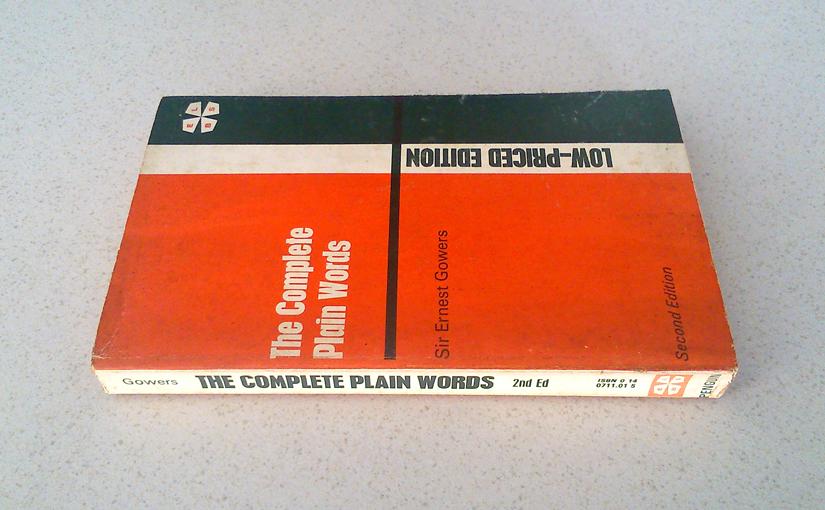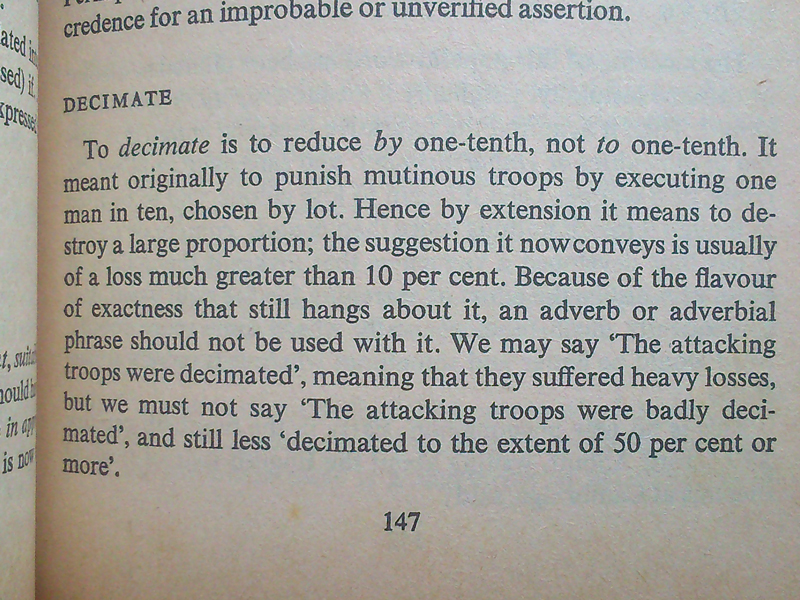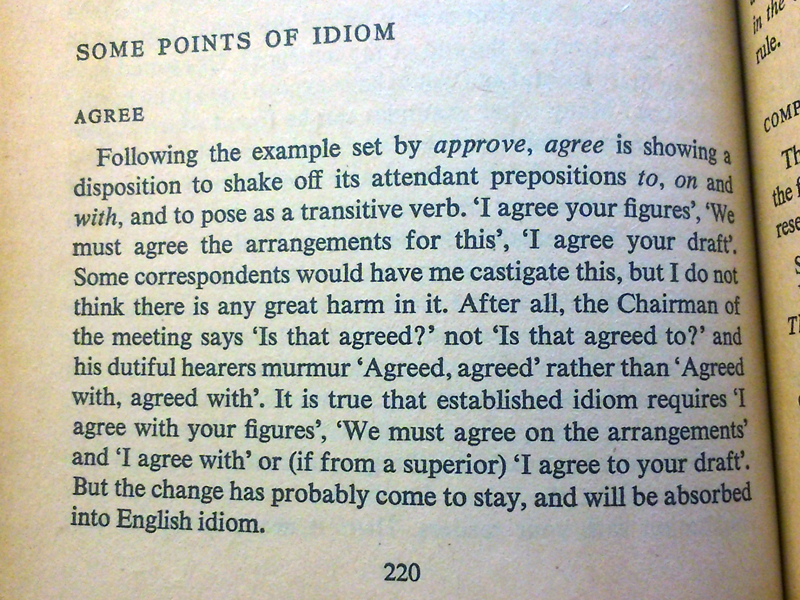
The Complete Plain Words (2nd edition) by Ernest Gowers
Reading this British book published in 1978 (a revised version of the 1948 original) was like going on an archaeological expedition in a foreign country. The English recommended by the author differs from my own for reasons of both time and place.
In some passages, the author of The Complete Plain Words speaks of the changes in the language that will inevitably take place in the decades to come; it’s almost as if he’s conversing directly with me, forty years in his future, at the same time that he’s conversing with his predecessor, thirty years in his past.
Our national vocabulary is a democratic institution, and what is generally accepted will ultimately be correct. I have no doubt that if anyone should read this book in fifty years’ time he would find current objections to the use of certain words in certain senses as curious as we now find Swift’s denunciation of ‘mob’. (53–54)
See below for what I learned, what stood out, and what I heartily agree with, as well as when and why I read the book.
What I learned from The Complete Plain Words
Pages 51–52: “Deadline (originally a line around a military prison beyond which a prisoner might be shot) has [taken] over the task of signifying a limit of any sort beyond which it is not permissible to go.”
Page 126: “Meticulous means, by derivation, ‘full of little fears’.” Thus, it retains a negative connotation (supposedly).
Page 222: “There is good authority for different to, but different from is today the established [British] usage.”
What Stood Out in The Complete Plain Words
The author’s attitude towards language rules is that we don’t not need them just because they’re artificial:
On the whole [the rules] are aids to writing intelligibly, for they are in the main no more than the distillation of successful experiments made by writers of English through the centuries in how best to handle words so as to make a writer’s meaning plain. Some, it is true, are arbitrary. One or two actually increase the difficulty of clear expression, but these too should nevertheless be respected, because lapses from what for the time being is regarded as correct irritate the educated reader, and distract his attention, and so make him the less likely to be affected precisely as you wish. (16)
Moreover, English language rules cannot be expected to follow logic:
It is not the habit of English to refrain from doing anything merely because it is illogical. (44)
Language change is inevitable:
English is not static—neither in vocabulary nor in grammar, nor yet in the elusive quality called style. The fashion in prose alternates between the ornate and the plain, the periodic and the colloquial. Grammar and punctuation defy all the efforts of grammarians to force them into the mould of a permanent code of rules. Old words drop out or change their meanings; new words are admitted. What was stigmatised by the purists of one generation as a corruption of the language may a few generations later be accepted as an enrichment, and what was then common currency may have become a pompous archaism or acquired a new significance. (42)
Even if you abhor language change, surely you must admit that there is is no “original” English usage to go back to:
[T]here is a point where it becomes idle pedantry to try to put back into their etymological cages words and phrases that escaped from them many years ago and have settled down firmly elsewhere. To do that is to start on a path on which there is no logical stopping-point short of such absurdities as insisting that ‘anecdote’ can only be applied to a story never told before, whereas we all know that it is more likely to mean one told too often. (53)
Political correctness—or, if you prefer, delicacy—is an inexhaustible source of language change:
[The substitution of euphemisms] may be natural and sometimes useful, but it has its limitations. If the unpleasantness, or the supposed unpleasantness, attaches to the thing itself it will taint the new name; in course of time yet another will have to be found, and so ad infintum. (75)
An opinion on the ever-contentious “decimate”:

Do people really use “agree” as a transitive verb?!?

I couldn’t have said it better myself…
Needless use of “respective” and “respectively” is a pet peeve of mine; I’m glad I’m not alone, though I could wish we’d made more progress escaping this sort of error in the last half a century.
It would be a fairly safe bet that respective (or respectively) is used unnecessarily or wrongly in legal and official writings more often than any other word in the language. It has one simple straightforward use, and that is to link up subjects and objects where more than one is used with a single verb. Thus, if I say ‘Men and women wear trousers and skirts’ you are left in doubt which wears which—which indeed is no more than the truth nowadays. But if I add the word ‘respectively’ I allot the trousers to the men and the skirts to the women. It can also be used harmlessly in a distributive sense, as in the sentence ‘Local Authorities should survey the needs of their respective areas’. But it contributes noting to the sense; there is no risk of Local Authorities thinking that they are being told to survey one another’s areas. Anyway it is neater to write ‘Each Local Authority should survey the needs of its area’. ‘Respective’ and ‘respectively’ are used wrongly or unnecessarily far more often than they are used rightly, and I advise you to leave them alone. You can nearly always get on without them.(85)
Many have mocked the “grocer’s apostrophe” that appears on signs that say, e.g., “banana’s”, but those who don’t write signs advertising produce are often guilty of inserting an apostrophe in other plural words, such as “DVD’s” or “1990’s”, where none is needed.
“Whether an apostrophe should be used to denote the plural of a word or symbol that does not ordinarily make a plural depends on whether the plural is readily recognisable as such. Unless the reader really needs help it should not be thrust upon him. It is clearly justified with single letters: ‘there are two o’s in woolly’; ‘mind your p’s and q’s’. Otherwise it is rarely called for. It should not be used with contractions (e.g. MPs) or merely because what is put into the plural is not a noun [such as ‘ifs, ands, or buts’].” (240)
People often mourn the loss of articulateness without realizing that it can be seen as a natural side effect of the spread of literacy.
When we are tempted to say that we have fallen away from the high standard of our forefathers, we must not forget the vast increase in the part played by the written word in our affairs. With such an increase in quantity it would be surprising if there were not some deterioration in quality. (316)
The ability to read and write was once the restricted domain of wealthy elites. Undoubtedly there was a range of abilities even among them, but thanks to innovation in communication technology, we are exposed to both the successes and the failures of education as never before.
What Ernest Gowers or the great H. W. Fowler himself would make of Youtube comments we can only guess.
When and Why I Read The Complete Plain Words
I like reading books about English usage. I recently bought this one (and the earlier book it was based on) at Book Treasure on Selegie Road.
Genre: non-fiction (writing)
Date started / date finished: 14-Jul-17 to 29-Jul-17
Length: 317 pages
ISBN: 0140711015
Originally published in: 1948/1978
Amazon link: The Complete Plain Words



